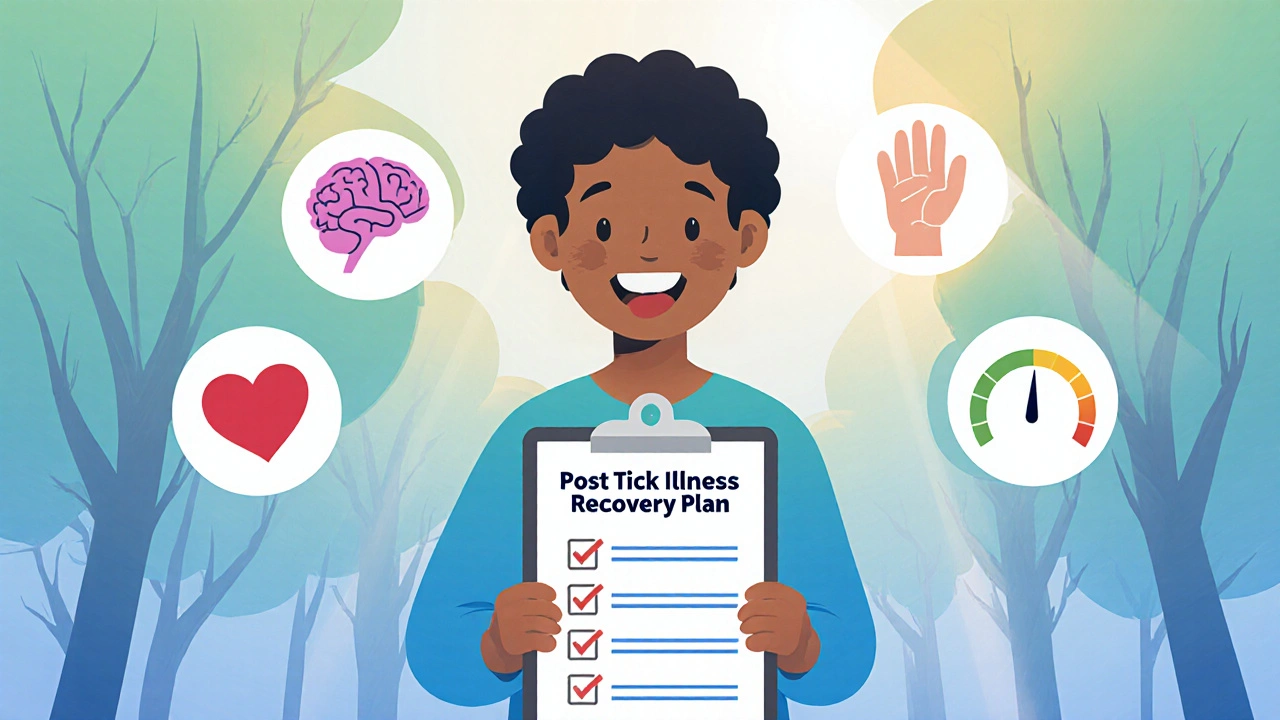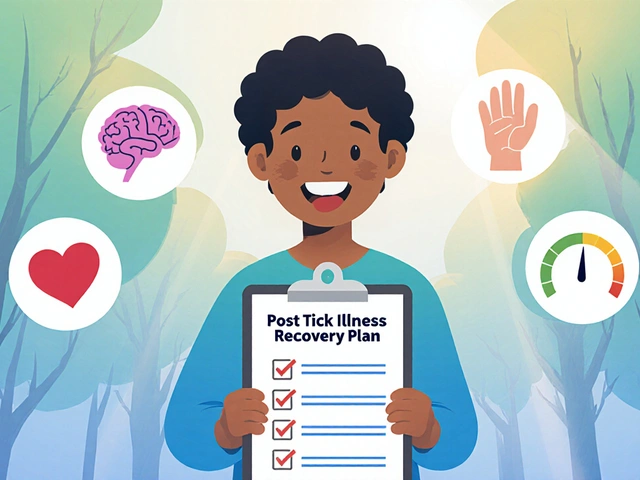Why Regular Check-Ups Are Essential for Tick Fever Survivors

Surviving tick fever doesn’t mean you’re out of the woods. Many people think once the antibiotics are done and the fever breaks, they’re fine. But for those who’ve had tick fever-whether it’s Lyme disease, Rocky Mountain spotted fever, or another tick-borne illness-what happens after treatment is just as important as the initial fight.
Tick fever doesn’t always vanish with antibiotics
Antibiotics like doxycycline or amoxicillin are effective at killing the bacteria that cause tick fever, especially when started early. But that doesn’t mean the body fully recovers overnight. Studies show up to 20% of people treated for Lyme disease report lingering symptoms months later-fatigue, joint pain, brain fog, or muscle weakness. These aren’t just ‘feelings’; they’re real, measurable effects on the nervous system, immune response, and energy production.
One 2023 study tracking 450 Lyme survivors in the UK found that those who had regular follow-ups with a GP every 3-6 months for the first year after diagnosis were 40% less likely to develop chronic symptoms than those who didn’t. Why? Because early detection of recurring inflammation, autoimmune triggers, or nerve damage makes a huge difference.
What happens if you skip check-ups?
Ignoring follow-up care can lead to complications that are harder to treat later. Tick fever can trigger autoimmune reactions where your body starts attacking its own tissues. This might show up as persistent arthritis in the knees, heart rhythm issues, or even neurological problems like facial paralysis or memory lapses.
One patient from Manchester, a 52-year-old gardener, thought he was fine after his 10-day course of doxycycline. Six months later, he couldn’t climb stairs without shortness of breath. A routine ECG revealed heart inflammation-something that could’ve been caught during a post-treatment blood test and echocardiogram if he’d gone in for a check-up. By then, he needed a longer course of steroids and cardiac rehab.
Another common issue is reinfection. Ticks don’t disappear just because you had one bout of fever. People who spend time outdoors-walking dogs, hiking, gardening-are at risk again. Without regular monitoring, a second infection can go unnoticed until it’s severe.
What should a follow-up visit include?
A good check-up for tick fever survivors isn’t just a quick ‘how are you feeling?’ It should include specific tests and assessments:
- Blood tests: CBC to check for lingering inflammation, liver and kidney function, and Lyme-specific antibody titers (IgG/IgM). High titers months after treatment can signal ongoing immune activity.
- Neurological screening: Simple tests for balance, reflexes, and cognitive speed. Many GPs now use the Montreal Cognitive Assessment (MoCA) for patients with brain fog.
- Joint and muscle exam: Swelling, tenderness, or reduced range of motion in knees, elbows, or wrists can point to post-infectious arthritis.
- Heart rhythm check: An ECG or 24-hour Holter monitor if you’ve had palpitations or dizziness.
- Discussion about sleep and mood: Fatigue and depression are common after tick fever. These aren’t ‘in your head’-they’re linked to inflammation in the brain.
Some clinics now offer a ‘Post-Tick Illness Recovery Plan’-a written checklist patients take home. It includes symptoms to watch for, when to call the doctor, and how to track energy levels daily.

How often should you go?
There’s no one-size-fits-all schedule, but here’s what works for most people:
- Month 1: First follow-up after finishing antibiotics. Check for side effects and initial recovery signs.
- Month 3: Blood work to see if inflammation markers have dropped. Assess energy levels and cognitive function.
- Month 6: Full review. If symptoms are gone, you’re likely on track. If not, it’s time to consider specialist referral.
- Year 1: One final check-up. After that, annual visits are enough unless new symptoms appear.
People with severe initial illness-like those who had meningitis or heart block-should see a specialist every 3 months for at least a year.
What to track between visits
You don’t need to wait for your appointment to catch problems early. Keep a simple log:
- Energy levels (1-10 scale)
- Joint pain locations and intensity
- Headaches or dizziness
- Sleep quality
- Memory lapses or trouble focusing
Apps like MySymptoms or even a notes app on your phone work fine. Bring this log to your check-up. It helps your doctor spot patterns you might miss.

When to see a specialist
Your GP can handle most follow-ups. But if you have any of these, ask for a referral to an infectious disease specialist or a rheumatologist:
- Joint swelling that doesn’t improve with rest or anti-inflammatories
- Heart palpitations or chest pain
- Memory loss or confusion that affects daily life
- Facial drooping or numbness in limbs
- Chronic fatigue lasting over 6 months
Specialists can order advanced tests like MRI scans for nerve damage or CSF analysis if neurological issues are suspected. Don’t wait until you’re overwhelmed-early intervention changes outcomes.
Recovery isn’t just about medicine
Check-ups aren’t just about labs and scans. They’re also about support. Many survivors feel isolated after treatment. Friends say, ‘You’re better now, right?’ But recovery is messy. Talking to someone who understands helps.
Some NHS clinics now run peer support groups for tick fever survivors. Others connect patients with occupational therapists who help retrain the brain after brain fog. Nutrition advice matters too-anti-inflammatory diets rich in omega-3s, vitamin D, and magnesium can reduce lingering symptoms.
One woman from Salford, who had Lyme disease twice, said: ‘The check-ups didn’t just catch problems. They reminded me I wasn’t alone. That made all the difference.’
Don’t wait for symptoms to come back
Tick fever is unpredictable. Some people bounce back in weeks. Others take months-or years. The key isn’t hoping you’re fine. It’s checking that you are.
Regular check-ups aren’t about being paranoid. They’re about being smart. They give you control when you’ve already been through something scary. They catch problems before they become crises. And they help you get back to living-without the shadow of ‘what if?’ hanging over you.
If you’ve had tick fever, your body still needs your attention. Don’t stop caring just because the fever’s gone.
Can tick fever come back even after treatment?
Yes. While antibiotics kill the bacteria, they don’t always eliminate all traces of infection, especially if treatment was delayed. Some people experience relapses due to persistent bacteria or reinfection from another tick bite. Regular check-ups help catch these early.
Are blood tests always accurate for detecting lingering tick fever?
No. Antibody tests can stay positive long after the infection is gone, which can be misleading. Doctors look at trends-whether levels are rising, falling, or staying high-alongside your symptoms. A single test isn’t enough; it’s the pattern over time that matters.
Do I need to see a specialist if my GP says I’m fine?
If you still feel unwell-fatigued, achy, mentally foggy-then yes. GPs aren’t always trained in post-tick illness complications. Persistent symptoms need specialist input. Don’t take ‘you’re fine’ as the final word if you don’t feel fine.
Can lifestyle changes help after tick fever?
Absolutely. Reducing sugar, processed foods, and alcohol helps lower inflammation. Getting enough sleep, gentle exercise like walking or swimming, and managing stress can speed recovery. Many survivors report better energy after switching to an anti-inflammatory diet.
Is it safe to go hiking or gardening again after tick fever?
Yes, but take precautions. Wear permethrin-treated clothing, check for ticks daily, and shower soon after being outdoors. Avoid tall grass and wooded areas during peak tick season (April-September). Your risk isn’t zero, but with care, you can enjoy the outdoors safely.


Jenny Lee
Just finished my 6-month check-up and my doc caught a weird spike in CRP I didn’t even notice. So glad I didn’t skip it. 🙌
Jeff Hakojarvi
Hey, I’m a nurse in Portland and I’ve seen too many folks think antibiotics = cured. Not true. I had a patient last year, 42, gardener, thought he was fine after doxy. Came back 5 months later with heart palpitations and joint swelling. ECG showed myocarditis. He needed IV antibiotics and a pacemaker. Don’t wait for it to get bad. Get that follow-up. You’re worth it. 💪
Timothy Uchechukwu
Why do we even trust western medicine on this? In Nigeria we use herbs and fasting. Antibiotics weaken the body. Your body knows how to heal itself if you stop poisoning it with pills. Why pay for tests when you can drink neem tea and pray? This is just pharma propaganda
Samkelo Bodwana
I’ve been living with post-tick fatigue for three years now and honestly, the most helpful thing wasn’t the bloodwork or the ECG - it was finding a community. I joined a local support group and realized I wasn’t broken, just scarred. The check-ups matter, sure, but the emotional validation? That’s what kept me from giving up. I used to think I was lazy. Turns out, my immune system was still fighting. And now I carry a little notebook - energy levels, sleep, brain fog - and I bring it to every appointment. It’s not glamorous, but it’s mine. And it’s helping.
Emily Entwistle
YES YES YES 😭 I’m so glad someone finally said this! I had Lyme twice and my GP told me I was ‘just stressed’ after my second round. I cried in the parking lot. Then I found a Lyme-literate doc and my life changed. Track your symptoms, people! Use MySymptoms! And yes, omega-3s are magic 🐟✨
Don Angel
...I just want to say, I appreciate the thoroughness of this post. Really. The structure, the references, the practical advice - it’s rare to see this level of care in medical content online. Thank you. I’ve shared this with three friends who are still in denial about their lingering symptoms. One of them finally made an appointment yesterday. 🙏
benedict nwokedi
Let’s be real - the CDC knows Lyme is underreported, and they’re suppressing data to protect the pharmaceutical industry. Why do you think they only recognize ‘chronic Lyme’ as ‘post-treatment syndrome’? Because they don’t want you to know you can be infected for YEARS. The blood tests are designed to fail. The ‘antibody titers’? A scam. I’ve been on herbal protocols for 18 months and my symptoms vanished - no labs, no doctors, just raw garlic and oregano oil. The system doesn’t want you cured - it wants you dependent.
deepak kumar
As someone from India who battled tick fever after a trip to the Rockies, I can confirm - this is 100% accurate. In India, we don’t have Lyme awareness, so I thought my joint pain was arthritis. Took me 9 months to connect the dots. I started tracking sleep, energy, and brain fog with a simple Google Sheet. My doc was shocked I had so much data. We caught a hidden inflammation spike. You’re not paranoid - you’re proactive. Keep going. 🙏
Dave Pritchard
For anyone reading this and thinking ‘I’m fine’ - I get it. I was there too. After my first bout, I felt great. But six months later, I couldn’t walk my dog without gasping. I thought I was getting old. Turns out, it was Lyme. I didn’t go back to the doctor because I didn’t want to ‘bother’ them. Don’t make that mistake. You’re not bothering anyone. You’re taking care of yourself. That’s the point. You’re not weak for needing follow-ups - you’re strong for showing up.
kim pu
So like… the whole ‘tick fever’ thing is just a capitalist ploy to sell blood tests and ECGs, right? Like, why not just do a 30-day keto cleanse and sauna detox? That’s what my wellness influencer said. Also, I think the government is using ticks as bioweapons. I’ve got a whole spreadsheet on tick density maps and NSA surveillance. And FYI - if you’re getting heart palpitations, it’s probably 5G. But also Lyme. Maybe both. 🤯
malik recoba
i just wanna say thank you for this. i had lyme last year and i skipped my 3 month check up because i was scared. then i got worse. i wish i had read this sooner. now i bring my symptom log every time. it’s not perfect but it helps. thanks for not making me feel dumb for needing help
Sarbjit Singh
My brother had tick fever in 2020. He ignored everything. Now he’s on disability. I shared this with our family. We’re all getting checked now. You’re not alone. 💙